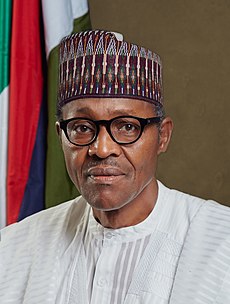Muhammadu Buhari
Muhammadu Buhari | |
|---|---|
 Official portrait, 2015 | |
| 7th and 15th President of Nigeria | |
| Assumed office 29 May 2015 | |
| Vice President | Yemi Osinbajo |
| Preceded by | Goodluck Jonathan |
| In office 31 December 1983 – 27 August 1985 as Military Head of State of Nigeria | |
| Chief of Staff | Tunde Idiagbon |
| Preceded by | Shehu Shagari |
| Succeeded by | Ibrahim Babangida |
| Federal Minister of Petroleum Resources | |
| Assumed office 11 November 2015 | |
| Minister of State | Emmanuel Ibe Kachikwu Timipre Sylva |
| Preceded by | Diezani Allison-Madueke |
| In office March 1976 – June 1978 as Federal Commissioner of Petroleum and Natural Resources | |
| Head of State | Olusegun Obasanjo |
| Governor of Borno State | |
| In office 3 February 1975 – 15 March 1976 | |
| Preceded by | Office established |
| Succeeded by | Mustapha Amin |
| In office 1 August 1975 – 3 February 1976 as Governor of the North-Eastern State | |
| Head of State | Murtala Mohammed |
| Preceded by | Musa Usman |
| Succeeded by | Office abolished |
| Personal details | |
| Born | 17 December 1942 Daura, Northern Region, British Nigeria (now Daura, Nigeria) |
| Nationality | Nigerian |
| Political party | All Progressives Congress (2013–) |
| Other political affiliations | Congress for Progressive Change (2010–2013) All Nigeria Peoples Party (2002–2010) |
| Spouse(s) | |
| Children | 10
|
| Alma mater | Nigerian Military Training College Mons Officer Cadet School U.S. Army War College[1] |
| Website | Official website |
| Military service | |
| Allegiance | |
| Branch/service | |
| Years of service | 1961–1985 |
| Rank | Major general |
| Battles/wars | Nigerian Civil War Chadian–Nigerian War |
Muhammadu Buhari GCFR (born 17 December 1942) is a Nigerian politician who has been President of Nigeria since 2015.
Buhari is a retired Nigerian Army Major General and has served as military head of state in Nigeria between 1983 to 1985, after taking power in a military coup d'état.[2][3] The term Buharism is ascribed to the authoritarian policies of his military regime.[4][5] Buhari has said that he takes responsibility for anything over which he presided during his military rule, and that he cannot change the past. He has described himself as a "converted democrat".[6]
Buhari ran for president of Nigeria in 2003, 2007, and 2011.[7] In December 2014, he emerged as the presidential candidate of[8] the All Progressives Congress party for the 2015 general election.[9] Buhari won the election, defeating incumbent President Goodluck Ebele Jonathan. This was the first time in the history of Nigeria that an incumbent president lost a general election. He was sworn in on 29 May 2015. In February 2019, Buhari was re-elected, defeating his closest rival former Vice President Atiku Abubakar by over 3 million votes.[10][11]
- ↑ Paden, John (2016). Muhammadu Buhari: The Challenges of Leadership in Nigeria. Roaring Forties Press. ISBN 978-1-938901-64-5.
- ↑ "Military Regime of Buhari and Idiagbon, January 1984 – August 1985". Archived from the original on 4 March 2016. Retrieved 12 September 2013.
- ↑ Max Siollun (October 2003). "Buhari and Idiagbon: A Missed Opportunity for Nigeria". Dawodu.com. Archived from the original on 6 April 2014. Retrieved 12 September 2013.
- ↑ Sanusi Lamido Sanusi (22 July 2002). "Buharism: Economic Theory and Political Economy". Lagos. Archived from the original on 12 March 2015. Retrieved 12 September 2013.
- ↑ Mohammed Nura (14 September 2010). "Nigeria: The Spontaneous 'Buharism' Explosion in the Polity". Leadership (Nigeria). Archived from the original on 29 June 2018. Retrieved 12 September 2013.
- ↑ Buhari, Muhammadu (26 February 2015). Prospects for Democratic Consolidation in Africa: Nigeria's Transition (Speech). Chatham House, London. Archived from the original on 27 December 2015. Retrieved 31 March 2015.
- ↑ "The frustrations of Buhari from 2003 to 2011". Vanguard News. 12 December 2016. Archived from the original on 1 October 2021. Retrieved 1 October 2021.
- ↑ "Nigeria election: Muhammadu Buhari wins presidency". BBC News. 1 April 2015. Archived from the original on 10 November 2021. Retrieved 23 September 2021.
- ↑ "Buhari in historic election win, emerges Nigeria's President-elect | Premium Times Nigeria". 31 March 2015. Archived from the original on 1 October 2021. Retrieved 1 October 2021.
- ↑ "UPDATED: Buhari wins second term". Punch Newspapers. 27 February 2019. Archived from the original on 6 September 2019. Retrieved 30 August 2019.
- ↑ Stephanie Busari and Aanu Adeoye, for (27 February 2019). "Nigeria's President Muhammadu Buhari reelected, but opponent rejects results". CNN. Archived from the original on 1 October 2021. Retrieved 1 October 2021.

